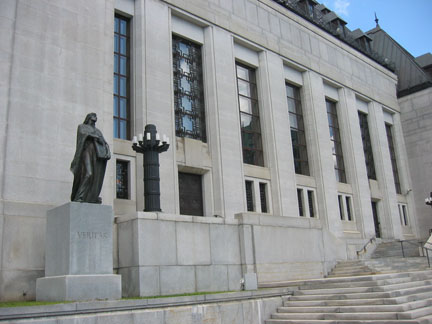
The Supreme Court of Canada today issued a ruling that backs the province of Alberta’s law that strips Métis settlement membership for anyone who at the same time holds Indian status, saying the law does not infringe on the Charter of Rights and Freedoms.
Chief Justice Beverly McLachlin, who wrote the decision in
Alberta (Aboriginal Affairs and Northern Development) v. Cunningham on behalf of the unanimous court, said it was OK for the province to use the Métis Settlement Act as the basis for revoking several individuals’ formal membership in the Métis community of Peavine.
While the litigants succeeded with their arguments against the government at Alberta’s Court of Appeal, the country’s top court said the law is constitutionally sound and serves the purpose of supporting the Métis people.
McLachlin noted that the claimants, who registered as status Indians to enjoy medical benefits under the Indian Act, specifically argued that the MSA contravened s. 15 of the Charter. The court disagreed. “I conclude that s. 15(2) of the Charter, which permits inequalities associated with ameliorative programs aimed at helping a disadvantaged group, provides a complete answer to this claim,” wrote McLachlin. “The purpose and effect of the MSA is to enhance Métis identity, culture, and self-governance by creating a land base for Métis. The exclusion of status Indians from membership in the new Métis land base serves and advances this object and hence is protected by s. 15(2).”
The court also denied the claimants’ argument that the act violates freedom of association, which is protected under s. 2(d) of the Charter, or liberty, under s. 7.
The SCC decision points out that s. 35 of the Constitution Act recognizes three groups of Aboriginal peoples: Indians, Métis, and Inuit. It also says the Métis and Alberta government negotiated to establish settlement lands for Métis communities, extend self-governance to those communities, and to guard Métis culture. The negotiations led to the passing of a bevy of legislation, including the Métis Settlement Act in 1990, which allowed the group to maintain its distinct identity.
“Mixed identity is a recurrent theme in Canada’s ongoing exercise of achieving reconciliation between its Aboriginal peoples and the broader population,” wrote McLachlin. “It figures, for example, in land claims negotiations between particular Indian groups and the government. Residents of one Indian group frequently also identify themselves with other Indian groups for historical and cultural reasons. Yet lines must be drawn if agreements are to be achieved.”

 The Supreme Court of Canada today issued a ruling that backs the province of Alberta’s law that strips Métis settlement membership for anyone who at the same time holds Indian status, saying the law does not infringe on the Charter of Rights and Freedoms.
The Supreme Court of Canada today issued a ruling that backs the province of Alberta’s law that strips Métis settlement membership for anyone who at the same time holds Indian status, saying the law does not infringe on the Charter of Rights and Freedoms.